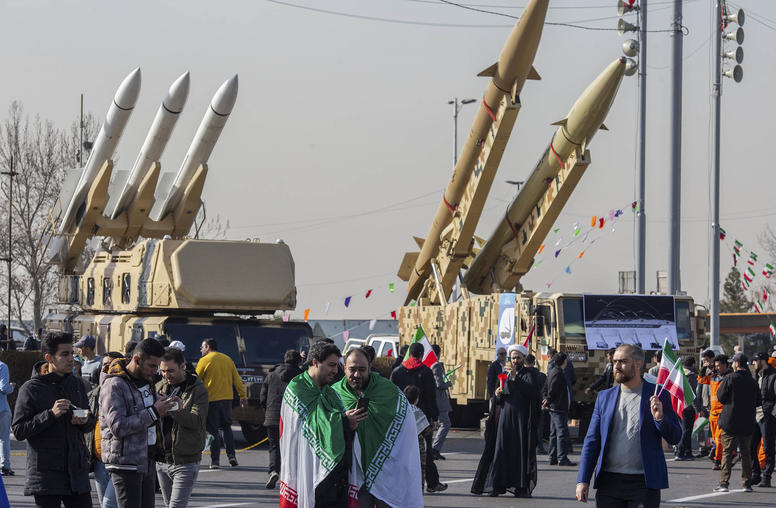Amid a Region in Strife, Lebanon Holds Parliamentary Elections
Will the new electoral law bring change or maintain the longstanding sectarian balance?
On May 6, Lebanese voters will elect a new parliament for the first time in nine years. This election introduces a new electoral law that scraps the former winner-take-all model in favor of a proportional representation system, aimed at opening the door for smaller parties and independent candidates to make it into parliament. While the election is an important development for Lebanon’s democracy and stability, it will be closely watched by regional and major powers alike, with implications on issues like the Saudi-Iran conflict and the war in Syria. USIP Director of Middle East and North Africa Programs Elie Abouaoun examines the importance of the parliamentary elections for Lebanon and the region at large.

What impact will the new electoral law have on Lebanese politics and traditional parties’ representation in the Parliament of Lebanon?
There is no question that the new electoral law, which adopts an element of proportionality, will allow some figures who do not come from the mainstream traditional parties to win seats in the Parliament of Lebanon. However, there are indications that the number of these breakthroughs will not be significant for the following reasons:
- The civil and political formations who united in some electoral districts in the last municipal election (obtaining around 40 percent of the votes in Beirut, for example) are not forming one coalition for the parliamentary elections. Some of these formations are running separately, which scatters the bloc of voters they could have mobilized.
- The lists running against mainstream parties were not able to develop a unified vision or political program. They ended up being a coalition of candidates who for various reasons could not run on partisan lists and of independent candidates who do not have enough popular support.
- Unlike most non-partisan candidates, those running with the traditional parties still enjoy access to resources and governmental patronage, which gives them a huge advantage compared to their rivals.
- Some candidates on the "non-partisan" lists do not enjoy a good reputation in general, which puts to question the paradigm of "corrupt politicians versus clean activists" that could have influenced some voters. Some of those candidates are known to be opportunists, if not corrupt.
The above-mentioned reasons as well as other structural issues related to the Lebanese political system itself will limit the possibility of significant breakthroughs.
What issues are the most important for Lebanese voters in this election?
When asked about priorities, most Lebanese would say security and stability, access to services, fighting corruption and economic improvements are very important in determining their choice. However, these issues are not new and have been part of Lebanese politics for the last three decades. Electoral behavior in Lebanon remains highly emotional and driven by the fear of seeing one's own socio-political group marginalized.
In a country where constitutional guarantees (to both individuals and collectives) exist in theory, but are rarely enforceable, and where government policies are sometimes absent, it’s likely that Lebanese voters will continue to vote for sectarian groups perceived as a safety net against systemic abuses. Until a creative governance model is found by the Lebanese—one that manages political diversity in a healthy fashion and hence addresses socio-political concerns and fears—it is not likely that voters will make their choices along the typical political or partisan fault lines found in other countries.
How has the war in Syria affected the electoral process?
The political polarization among Lebanese political actors over who is doing what in Syria has played a major role in this electoral campaign.
The participation of Hezbollah in the military operations in Syria is still a matter of high contention among Lebanese. It also ties to the ongoing debate in Lebanon about the purpose of Hezbollah's arsenal in Lebanon.
The massive influx of Syrian refugees has been another other major flash point in election campaigns. While most Lebanese are against any form of permanent settlement for these refugees in Lebanon, there is a sharp divide among political parties about the best way to facilitate or provide humanitarian assistance without encouraging a long-term presence that could lead to a potential demographic change. Many candidates have focused on this issue, mostly those considered to be categorically opposed to accepting Syrian refugees, in the form of hard line (in some cases hateful) discourse.
This type of overcharged political discourse helps steer the voters to an even more emotional vote on May 6 and plays to the advantage of the most populist candidates.
What implications will the outcome of the Lebanese elections have for regional powers like Iran, Saudi Arabia, and Israel?
From a macro perspective, the overall outcome of the elections is already known: Hezbollah and its allies will still retain a strategic control over the parliament (and hence the government) that would allow the party to veto or block any decision that it considers as threatening to the existence or the strategic interests of the party. So, from this perspective, there will be no surprises neither to Hezbollah nor to regional powers like Iran, Saudi Arabia or Israel.
Beyond a direct military confrontation with Hezbollah, Israel does not have many options to deal with this situation. However, the Saudis do. They need to first adopt a clear vision about whether they stand ready to accept sharing regional influence with the Iranians or not. In the latter case, they would need to do a better job building alliances inside Lebanon, mainstreaming their political vision, applying the necessary resources to confront Iran and most importantly make sure this vision corresponds with the priorities and resources made available by the major powers in the region (e.g., the United States, European Union, Russia, and China).
Short of such a structured and inclusive process to share the region with or confront Iran, it is hard to envisage major changes in the regional landscape.



